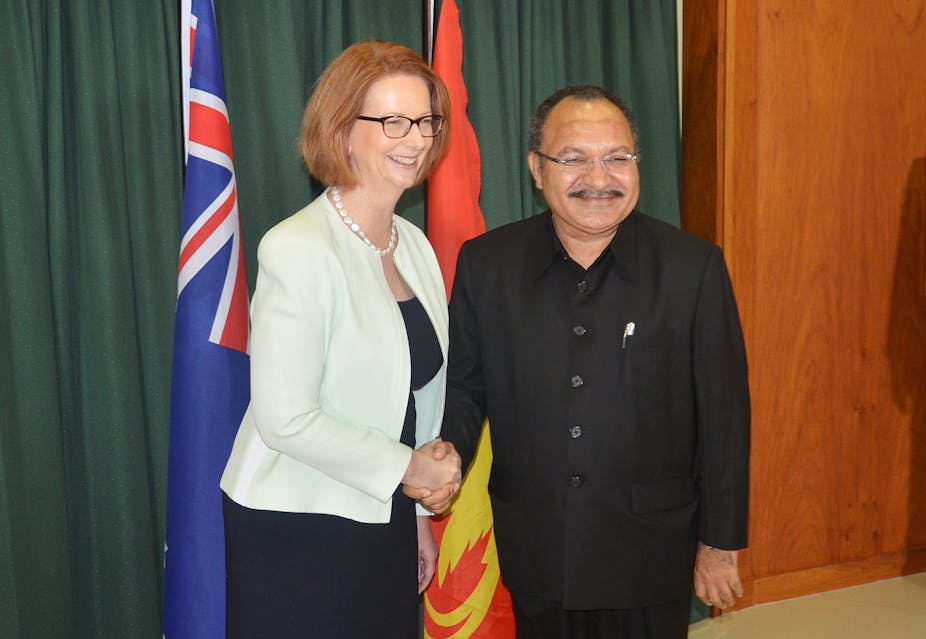Prime minister Julia Gillard returned from her first official visit to Australia’s nearest neighbour and former colony Papua New Guinea (PNG) on Saturday with little to show for it.
Reports of the visit - the first by an Australian prime minister since Kevin Rudd’s visit months after his election in 2007 - focused on PNG prime minister Peter O’Neill’s complaint about the difficulty of obtaining Australian visas and the A$16 billion Australian investment in PNG. This was set against a background of horrific stories of the treatment of women accused of sorcery.
Indicative of the nature of the relationship is the small number of Papua New Guineans who live in Australia. The 2011 census counts under 27,000 people born in PNG of whom fewer than 6,500 identify primarily as Melanesian or Papuan, which is less than half the number of Australians who live in PNG.
Gillard’s announcement of measures to simplify access to Australian visas, though falling short of O’Neill’s request, will be welcomed by those in PNG with the resources and desire to come to Australia.
However, recent reports of a high profile PNG criminal living in Australia on a 457 foreign skilled worker visa suggest that not all Papua New Guineans are unable to travel to Australia. Off the table were discussions about the level of proceeds of crime - estimated up to hundred of millions - that PNG’s anti-corruption task force chair has found to have been transferred from PNG to Australia.
Another highly emblematic feature of the relationship is the use that Australia makes of the Manus Island asylum seeker detention centre. The announcement that Australia will build a permanent detention centre, though lacking in detail, responds to criticism of the facilities by Australia’s own immigration department.
More troubling is the fact that the asylum seekers will be processed by PNG immigration officials, allowing Australia to deny responsibility for the outcome of their claims. As with the detention centre in Australia’s other former colony, Nauru, the government is selective in the use it makes of PNG’s sovereignty.
The real significance of Gillard’s visit lies in the symbolism of a prime minister facing almost certain imminent electoral defeat paying a visit to a country that, for all its strategic, economic and humanitarian importance, receives only sporadic attention from Australian governments. When they take place, prime ministerial visits usually serve as a platform to announce new-found enthusiasm for paying such attention.
When Kevin Rudd visited in March 2008, he sought to reinvigorate the relationship between the two countries, which had become decidedly frosty during the final years of the Howard government. To this end, Rudd announced a significant enlargement of the aid program and Australia’s hosting of the 2009 annual Pacific Islands Forum (PIF) heads of government meeting. This was followed by the Pacific Seasonal Workers Pilot Scheme (PSWPS), breaking a long-standing taboo against temporary migration for unskilled workers.
The last time that Australia had hosted the PIF meeting was in 1994, at which time it was also seeking to reinvigorate its relationship with the Pacific Islands.
During his prime ministership, John Howard also launched a new and invigorated engagement with the Pacific Islands. In 2003, he inaugurated Australia’s “new interventionism” in the region with the Regional Assistance Mission to Solomon Islands (RAMSI). That year Australian officials successfully lobbied to have Australian diplomat Greg Urwin elected secretary-general of the PIF, against the convention that the post be occupied by a Pacific Islander, and Howard was chosen as Pacific “Man of the Year” by Pacific Magazine.
Between these moments of enthusiasm, Australian engagement with the Pacific Islands tends strongly to drift and stagnate. Since the enthusiasm that Rudd initiated, Australia has antagonised Pacific Island governments by pressuring them to moderate their position on climate change and aligning itself with France over the future of New Caledonia.
More revealing than such differences has been the reversion to a familiar attitude of low expectations and little innovation, notwithstanding the consistent work of former parliamentary secretary Richard Marles.
It is in this context that Gillard’s visit to PNG should be interpreted. The fact that the key announcements of her meeting with O’Neill amount to more of the same defence, policing and detention centre policies of the past is novel only for its lack of novelty. Even more unusual is the citing of the long forgotten 1987 Joint Declaration of Principles as the foundation of the latest accord between the two countries.
If Australia is to be a better neighbour and realise its policy objectives in its relationships with the Pacific Islands, its leaders must learn to think of Australia more as part of the region. While Gillard’s visit is certainly better than nothing, its timing and content offer little hope in this regard.
Perhaps Shadow Minister for Foreign Affairs Julie Bishop’s interest in and visits to the region offer some hope that a future coalition government will learn to maintain a more steady engagement.

